#misinterpretated this whole plot point and the majority of his quotes!!’
Text
I hate randomly blocking people that follow me for no reason other than “what they draw makes me uncomfortable” because it illustrates a fundamental misunderstanding of MY SCRIMBLO (/lh). I understand it’s simply conjecture, but people who highlight that part of his light novel (a part that was revealed to be a dream and not close to canonicity) bother me a lot.
#in short… I hate the Pol//aris P Po//lanski shit#14 year old D//GR fans will be like ‘I know so much about Byakuya 🥺🥺 I read a brief synopsis of his light novel and completely -#misinterpretated this whole plot point and the majority of his quotes!!’#if you didn’t know: in the light novel he has to cross dress to get into the Legacy Crown Championship#(which decides who is head male - and who gets exhiled)#but if you BOTHERED to read the ending of the dubiously canon novel and his CANON LINES you would know that the plot is actually all in -#-Bl//ue Ink’s head (his step sister who ‘documents’ his legacy as he thinks he is destined to win)#- false memories. I can’t EXACTLY remember why but it was only a dubious recollection of actual events — and in-game and in the novel -#-Byakuya is recognised as#- one of the 15 ‘gold rank’ Tog//ami siblings and therefore never needed to cross-dress to get into the race in the first place#also the book is just hella confusing and awfully gruesome LMAO#but the drawing had his disguise in glasses when Pol//aris wore contacts!! because in the novel Byakuya states he finds glasses unappealing-#-on a woman. though fashionable for himself as a man (thanks ‘Kuya… I have 20/20 vision and I still hate that).#so yeah I was mega uncomfortable for no reason I’m just pedantic and I hate the fandom (for the most part)#I love you guys though LMAO#sorry I sounded like a gatekeeper LOL#I’ve ran into like… 3 more wives of Byakuya and I do actually really like their content and was okay with them but I didn’t interact beyond-#- a cursory glance because I don’t want to risk myself being uncomfortable or anyone else. I only have a lot of warnings because there are -#-fringe cases I really hate. so I have to use umbrella terms.#(so I am not THAT BAD. but I can be especially with the non-canon Pola//ris stuff and blatant misinterpretation#I FEEL SO MEAN.#not good for business.
8 notes
·
View notes
Text
Qui-Gon Jinn: Certified Hypocrite, Fascinating Failure, Mass of Contradictions
For starters, I am just going to let direct quotes from the man speak for itself.
Some excerpts from Master & Apprentice

Wise words.

Wait a minute...

😯😯 What the hell is happening here? All quotes are from the same man in one book.
Qui-Gon Jinn doesn't have an ounce of self-awareness and it is so hilariously terrible.
What is even better (or worse), this is perfectly in line with The Phantom Menace characterization .
I mean,

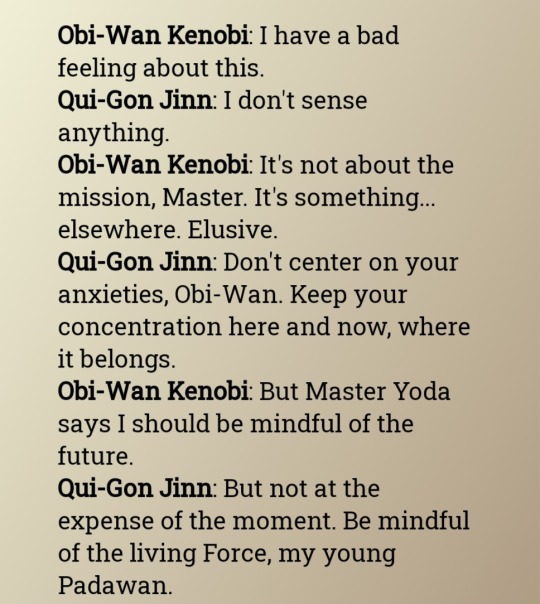
Remember when he said all this than spent the rest of the movie obsessing over prophecies, the chosen one and literally the future?
"He still has so much to learn of the living force." Qui-Gon Jinn about Obi-Wan in the council scene
After that scene
"The boy is dangerous. They all sense it why can't you?" Obi-Wan Kenobi about Anakin Skywalker to Qui-Gon Jinn
You see Obi-Wan, Master Jinn here has completely lost any sense of "here and now" between his crusade against darkness and divine mission to save the Galaxy.
This in turn, unsurprisingly blinds him to the fact Anakin is not suitable to become a Jedi. Or at least not ready to directly move on to becoming a padawan.
Anakin himself would suffer in a road that is not meant for him. But he is not planning for Anakin the child. He is thinking about The Glorious Chose One.
He is the chosen one. You all must, see it.
And yet from Qui-Gon's perspective it is Obi-Wan who doesn't understand the Living Force.
I have to say if he is truly a student of the living force as many fans claim he has been failing the class for at least 8 years.
Let's move on to another set of entertaining and horrifyingly oblivious quotes from M&A.

If you look upward you can observe Mr. Here and Now in his natural habitat.
He really acts like future is set in stone than thinks he is the right person to talk about about concentrating in the moment. Unbelievable.
Let's look at this dialogue again. In contrast with the excerpt from above.
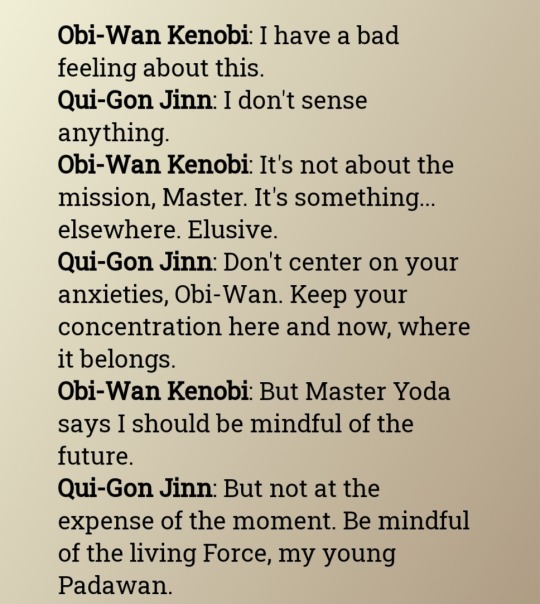
He is all about the future when it suits him. But when Obi-Wan makes a remark on it he obviously should just focus on the moment. This is actually the third time in this post where he contradicts himself while specifically chastising or criticizing Obi-Wan for something Qui-Gon actually does.
Now I don't think Qui-Gon acts with malice. But it is important to point out his obliviousness has become a way of ensuring he is never in the wrong.

He suffers from an immense hubris. And a man obsessed with prophecies and chosen ones definitely has some kind of savior complex.
But notably Jinn doesn't actually want to put any effort into enacting real change with his limited yet existent capabilities.
He turns down a council seat in M&A because he thinks it would hold him down. From what? Dear God, the reason they offered him a seat was for different opinions. Qui-Gon can complain all he wants but one time he actually had a chance to make his opinions a reality he freaking bailed.
Why? He doesn't want to face his own limits. He can't bare to try and fail. It is much easier to sustain a superiority complex when you are complaining from the sidewalk.
So he fixates all this belief onto prophecies, visions that will magically cure the Galaxy. And of course his place to help fulfill them. To the point where it is the one thing that keeps him standing.
He has binded meaning of his life and belief for goodness dangerously close to his supposed importance in the Galaxy. (You can feel the influences of his former master)
His absolute refusal to engage with reality turns him into mass of contradictions. Cause he doesn't know what he will find or become if he is mistaken in his belief of himself.
He can't face reinvention on the event of defeat.
But this situation was different. It had to be, because the only thing Qui-Gon knew to be absolutely true was that his vision was real.
Oh by the way, it turned out he misunderstood the vision. But when does being wrong ever stopped Qui-Gon Jinn?

No words.
Only Qui-Gon could have come near declaring himself a prophet after making a mistake. Maybe stop and reflect man? Just stop and think about your actions.
Obi-Wan Kenobi: I have a bad feeling about this.
Qui-Gon Jinn: I don't sense anything.
Of course you don't.
Honestly he doesn't have much to speak for in the cosmic force department either.
(There is the whole force ghost thing I guess. But I have no idea if that is more connected with living or cosmic force. It seems to be more about spiritual enlightenment. Which is ridiculous when you consider Yoda had go through so many trials, face his darkside, learn to truly let go just for Force priestesses to deem him worthy enough to study immortality. Yes Qui-Gon never became a force ghost but he had started his training before he died. And much of Yoda's tests on TCW was about self-awareness. It is not just about being a good person. How did Force Priestesses approve Qui-Gon "I was meant to misinterpret this vision." Jinn? I would understand if he became wiser after death and faced his flaws and all but he never was on that level before he died. You might say even Anakin became a force ghost. But I would remind you, Anakin in the end broke out of denial, acknowledged the wrong of his ways and took that leap to the light side. Self-awareness seems such an important key to becoming a force ghost. Right there with selflessness. Personally it doesn't quite feel right for a character whose biggest flaws are their lack of introspection and hubris which we never see him rise above to be the one that discovers immortality again. It feels more like a rushed plot point to explain how we get from A to B.)
This post got out of control 😂. I honestly just wanted to point out lack of communication might be one of the reasons Obi-Wan and Qui-Gon have trouble understanding each other but it is sometimes even harder to understand Qui-Gon when he actually says something. Cause ration is not what drives him.
Qui-Gon is such a complex character. He is undeniably good especially compared to other SW characters. Yet for all fandom's deifying he might be the most flawed Jedi we see on the franchise. (The ones that fell to the dark side not included.)
It is a shame wider fandom completely write off his flaws to the degree I can't even recognize the character when they talk about Jinn. Cause that Qui-Gon is so hard to feel empathy for.
When people constantly make statements like "He is The Wisest sw character." his hypocrisy stops being amusing. It doesn't end on screen or page instead often used to bash other characters.
An unbelievable analysis from Wookiepedia:
When Jinn saved the Gungan exile Jar Jar Binks, who in turn swore a life-debt to him, his compassionate nature was such that Jinn took the hapless Gungan under his wing, much to Kenobi's dismay. His empathy toward all life forms, including the most pitiful and unfortunate, was Jinn's greatest strength. Additionally, he remained understanding and patient with Queen Padmé Amidala. During the short time they knew each other, he never asked for her to do more than she was willing to.
You know out of the two, Qui-Gon was the one who insulted Jar Jar to his face. And he didn't took Jar Jar under his wing. They forced him to take them to a city where Jar Jar could have been punished for entering. Now it was the pragmatic thing to do. For all three's survival not for their own gain. Understandable. But compassion is just pushing it.
Also he never asked Padme to do more than she was willing to do?
Padmé : Are you sure about this? Trusting our fate to a boy we hardly know? The Queen will not approve.
Qui-Gon Jinn : The Queen does not need to know.
Padmé : Well, I don't approve.
And he is aware she is the queen, herself. Padme was nearly tearing out her because of this man in TPM.
What is weird, Jinn in his bewildering hypocrisy probably thinks he is being admirably compassionate with Jar Jar, highly understanding and patient with Padme. We clearly see he is not.
Out of universe he has been a force ghost for decades now but fandom is nowhere near acknowledging his flaws than he is.
And honestly SW doesn't have that many major morally complex characters. People like Maul, Palpatine, Anakin,Ventress don't think they are serving a higher purpose or oblivious to the evils they commit.
Emotionally complicated, yes. Going through moral dilemmas, no.
Three major characters come to mind who make huge mistakes, condone or commit atrocities while thinking they are in the right/with good intentions/for a greater cause. With varying degrees of culpability.
Qui-Gon. Padme. Dooku.
In that order.
Let these characters be interesting instead of demonizing nearly inhumanly selfless Jedi characters. (They make mistakes too but funnily enough they are still way better beings than most people on our planet.)
By the way I found the epitaph "Fascinating Failure" from the article here. Especially the last paragraphs make some interesting points. ⬇️

👀
This post might seem harsh but that is expected since it focuses on Qui-Gon's flaws.
"People are more than their worst act,” Quote from Qui-Gon Jinn in Master & Apprentice
#qui gon jinn#Qui-Gon Jinn#obi wan kenobi#Obi-Wan Kenobi#meta#character analysis#pro jedi#in defense of the jedi#long post
181 notes
·
View notes
Text
OPINION: How Umineko Changed My Entire Approach to Fictional Media

All screenshots captured on Playstation 3 by author
The following article contains a discussion of thematic elements and motives that appear during the second half of Umineko When They Cry. While no actual plot details will be revealed, some might still consider it spoilery. So if you want to experience one of the greatest pieces of fiction ever completely untainted, you should check it out on Steam right now.
The internet is pretty rad, isn't it? You can follow your favorite creators, watch tons of awesome shows, and talk about your favorite things with other people. How about we do that right now? Well, too bad, because YOUR FAVORITE THING IS BAD, ACTUALLY! You made the mistake of posting about it online, so prepare to be sent lots of negative comments linking to 5-hour video essays pointing out every single flaw about your favorite story and why you are wrong for enjoying it!
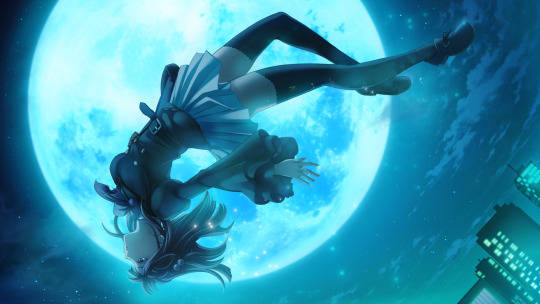
It's a situation I'm sure many of us have experienced at least a couple of times online. While the internet can be fantastic for finding like-minded people to chat with about things you deeply love, it can also be a gamble and sometimes you end up in a discussion where your conversational partner seems more interested in showing off their intellectual superiority over a work instead of openly discussing its merits or flaws. I certainly know — I used to be one of them.
"As I've eaten my way through countless tales to escape boredom, I haven't really been eating them. I've just been killing them." - Hachijo Tohya
The rise of social media has opened the gates for some incredible in-depth discussion and has changed the way I experience things over the years. But there is also a dark side to the discussions on the internet and that is the trap of wanting to feel intelligent in how you approach stories, which is often accompanied by not really being emotionally earnest. I myself tried to come off as perceptive by pointing out so many mistakes and bad things about media which led to exactly one thing: me becoming absolutely miserable. All I cared about was consuming as many things as possible (FOMO's also one of the many downsides of social media) and appearing as "smart" about them as I could. Until one fateful 10-month stretch in which I played a certain visual novel known as Umineko When They Cry.

Umineko really is tailor-made for catching people with that mindset: It depicts a mystery story about how mystery stories are told and consumed — and what genre would be more fitting to challenge someone concerned with intellectual superiority than one that is all about the clash of Author vs Reader?
"Books aren't a competition. It's not about who's read the most. But boasting that you've read all your ever need to read is just as wrong-headed" - Battler Ushiromiya
Umineko starts off with a well-known mystery trope: A family meets up in a mansion on a distant island, gets cut off by a storm, and then slowly gets murdered one after the other until everyone is dead. And just as in Agatha Christie's And Then There Were None (which served as one of Umineko's main inspirations), a bottle detailing the events of the incident to the public eventually washes ashore. But this only serves as Umineko's prologue, as its main character Battler quickly finds himself facing off against a self-proclaimed Golden Witch known as Beatrice on a meta-narrative level where he must prove these gruesome killings could have been committed by a human culprit, or be forced to acknowledge her existence and allow her to fully revive.
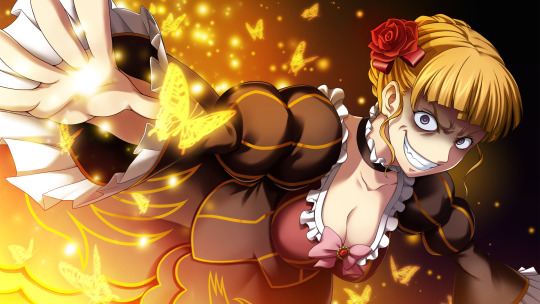
Thus begins a game of chess filled with exceedingly preposterous murders in which our protagonist's family gets killed by demons, giant goat butlers, and sharpshooting bunny girls — all supplemented by the so-called Red Truth, a truth-revealing tell not unlike Martha's vomiting in Knives Out. Battler must use these authorial proclamations and find a loophole that enables him to explain the murders in a way that does not frame any of his beloved family members as the killer and still allows him to deny the existence of the gruesome and torturous witch.

Umineko's all about how stories are perceived and told by both their creator and their audience. It explores how remarks by the author in every situation — no matter how off-hand they might be — can be used, applied, and twisted to shed a completely different light on a story regardless of its original intent. It shows how adding meaning to a narrative that wasn't meant to be there can both add to or subtract from its most important element: The heart its creator wanted to convey.
"If I had found meaning in only exposing the truth, I would have sunk to the level of a truth-revealing witch and fallen into ruin, spreading only hatred, [...], crushing and refusing to acknowledge anything but the particular truth I seek, unable to escape the cycle of misery." - Ange Ushiromiya
Umineko goes through many different angles of how we create, share, and discuss the tales that fuel our discourse. It ponders the importance of rules when creating storylines and tackles how easy it is to overlook major themes and motives by just focussing on minute details that are open to misinterpretation and irrelevant to a story's soul. It even includes the typical misanthropic yet oh so intelligent detective that usually gets idolized in most media (think BBC's Sherlock or House, M.D.) and puts them at odds with every other character because who would really want to cooperate with someone that completely disregards you as an equal human being and merely perceives you as an amalgation of hints, motives and alibis?
"Sheesh! Just one more step and I'd have been able to take a heart as innocent as the smooth sand just after a wave had pulled back and tear it to bits. What a shame. This isn't fun anymore." - Erika Furudo
And just when you start to really get into Umineko, it moves away from its main conflict, providing you important hints for its solution which most readers ignore as they aren't presented with facts and logic but on an emotional level distanced from the characters we long to get back to. But most importantly, it conveys how one single element is so indispensable to enjoying the narrative odysseys we embark on in our lives, to cherishing the characters that are presented to us in these tales, and to truly understand a story's message behind things like story developments, plot twists, and narrative tricks. I, of course, am talking about love.
Be it the love you feel for characters, for certain staging elements, phrasings of prose, orchestrations of music, design of sound effects, implementations of themes and motives, or cinematographic puzzle pieces — the one thing that is indispensable to truly enjoy all kinds of media, is love. Or, to quote Umineko directly, "Without love, it cannot be seen."
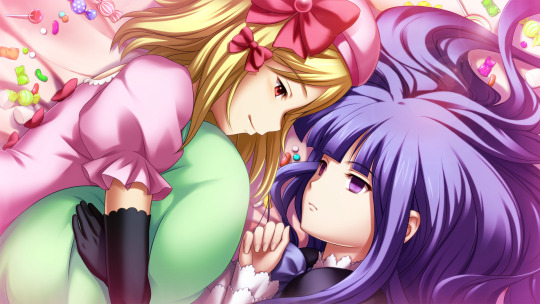
By the time, I was nearing the end of Umineko's eight main chapters, it had transformed from an intellectual battle between author and reader to an all-out war of a story against its community of readers who simply wanted to tear it down to cold, hard "facts." I had spent ten months and over 100 hours. The first half took eight of those months to get through (owing to a few lengths in Episodes 2 and 4), I finished the second half in less than two despite my busy schedule. I even dedicated a whole 15-hour marathon to the final episode as I was too glued to the grand finale to move away from it.
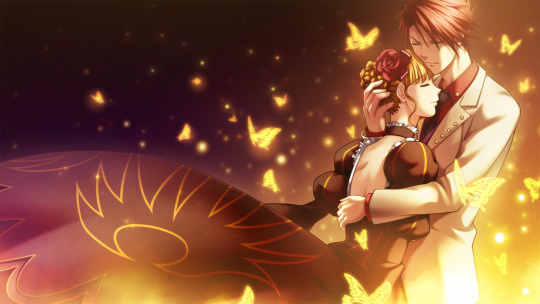
A new me came out the end. I no longer had an interest in tearing apart media for minor missteps. I enjoyed them much more deeply and honestly and began taking my time with the things I consumed. Instead of filling my plate at the buffet of stories as much as I could, I gave each dish its own course on the menu so I could appreciate its flavor in a different way — one bite at a time and not stuffed up simply to give the outward appearance of a seasoned gourmet. And for that, I will never be able to thank Ryukishi07 and his co-creators at 07thExpansion enough.
"The point of theory-making is not to create a culprit or to trample the truths that lie in the hearts of those who have not sinned. If you want to play detective, don't neglect the heart. Otherwise, we're just intellectual rapists. Don't forget it!!" - Willard H. Wright
If you are interested in reading Umineko When They Cry, you can find both its Question Arcs and its Answer Arcs on Steam, GOG, and MangaGamer. You can also read the manga adaptation digitally on Bookwalker (though I personally recommend the visual novel for its award-worthy soundtrack alone).
What work of fiction has touched your life in a profound way? Tell us in the comments!

René Kayser works for Crunchyroll as a PR and Social Media Manager in Germany. You can find him on Twitter @kayserlein where he tries to get people into Umineko every single day.
Do you love writing? Do you love anime? If you have an idea for a features story, pitch it to Crunchyroll Features!
19 notes
·
View notes
Text
I wanted to take some time out of our irregularly scheduled content to talk about something near and dear to my heart: Komaeda’s voice. Specifically, two of his character songs which I have been more eager to dissect than you know.
A couple of points before we begin:
These songs were not written by the same people who designed, scripted or even localised Komaeda, but rather his Japanese VA, Megumi Ogata. It has, however, been sanctioned as canon material, even released under the Danganronpa brand. Therefore, I will treat it with the same consideration that I do explicitly canon material.
The songs are, of course, in Japanese. I do not speak this language, so I’ll be going off the translations available on the DR wiki. If you do speak Japanese and you realise I’ve missed or misinterpreted something due to the language barrier, please let me know. Otherwise, as an English speaker, I’ll do my best with what I have.
My goal here is to reconcile his musical characterisation with his canon characterisation, as well as extrapolate whatever new things we can learn from these songs about our beloved boy. And if you’re reading this crazy long post and thinking, “wow, she’s reading way too into this,” ... yeah. That’s sort of the fun of it. My goal isn’t to challenge anybody, or shame anyone’s headcanons. This is just a weird niche hobby of mine.
Apologies for the lack of a cut. This much text, I felt, might be a little hard on some peoples’ eyes on my theme. It is tagged though.
Okay, onto the good stuff.
Zettai Kibou Birthday is, according to Megumi, a song about how Nagito feels on the “outside”. It contains a literal narrative and a metanarrative which is a word I like to use to sound smart, but in this case, just refers to an overarching interpretation that isn’t necessarily verbatim, but rather is represented, or is provided a structure, or is given meaning by the actual text.
In this case, the literal narrative is this: Nagito meets somebody on campus he was “born to meet”, and they have some sort of steamy rendezvous, and in amongst all the smooshing, there are several references to absolute hope. However, the song isn’t supposed to be a literal recount of events, but rather an expression of Nagito’s feelings; about hope, love, intimacy and connection. This is the metanarrative. The plot, if you will, is simply a presentation of that message.
While the song functions on a conceptual level and not a physical one, it interests me that sex is the medium through which he allegorises hope, intimacy and interpersonal connection. I think it’s also interesting that hope and intimacy are grouped together, as if to find one is to find the other. To quote Nagito himself, “Now that I’m on the verge of death, I’ve finally realised what I wanted all along: somebody’s love.”
Again, the song isn’t literal. It captures a feeling, likening that exhilaration and comfort of making a deep and impossible connection to the feeling of finding Ultimate Hope. And for someone who has been so lonely for so long, it makes sense he would find that hope in another person. Someone who isn’t afraid to be close to him in every possible sense of the word.
Now let me get it out there - I don’t expect a song like this to have explicit depictions of sex or anything. There is a fine line to walk when using the topic in media lest you be branded with a hard “lewd” rating, but there’s still no shortage of ways to use it without being explicit. Take, for instance, Carla Gugino & Oscar Isaac’s cover of Love Is The Drug. (Why the cover and not the original? Because I actually liked Sucker Punch, fight me.)
Late that night I park my car / Stake my place in the singles' bar / Face to face, toe to toe / Heart to heart as we hit the floor
Lumber up, limbo down / The locked embrace, the stumble round / I say go, (and I say yes) / Dim the lights, you can guess the rest
The words describe literally what is going on, while still invoking the right mood and the emotions the characters in the song were feeling. It’s very well-balanced lyrically, especially with what Oscar and Carla’s performance brings to it. Contrast, if you will, with:
So lock up, mix up, cut up… key up, sex up, wrap up / I'll let you mess me up and indulge
That's it, break up, use up, end up… hook up—because we're connected / The omen of hope after the worst disaster
If you look close, you can definitely see what’s happening in the actual narrative of the song. However, the details are more or less obfuscated under this layer of words that don’t really mean anything on their own. It’s more like a flurry of different sensations rather than one, tangible experience. These feelings he’s having during these experience are, in the next breath, directly correlated with connection, and then hope.
Nagito is a guy who works on the conceptual and the philosophical more than the literal. Even in canon, he’s heavily into symbolism. He likes to carry around Go stones because of what the colours represent to him. So this use of intimacy and word play to describe a significant bond between two people is remarkably fitting. What’s literally happening isn’t half as important as what is going on beneath the surface, and the way it makes him feel.
Like I said, it’s interesting that, of all the ways he could express hope and connection, this is the one he went with. I do believe that this also expresses an underlying attitude towards intimacy; that it’s something he only wishes to share with someone truly special. In many fan circles he is portrayed as a highly sexualised character, even though in the canon media, he is quite chaste, never taking any sexual interest in a situation that isn’t sexual; for instance, any of the many times Mikan falls over herself and winds up in a suggestive pose. (And nor should he, let me stress.)
And I can already foresee the counterargument that Nagito is gay, so of course he won’t enjoy seeing a girl’s underwear; and to that, I have two points. One is that, personally, I disagree. This doesn’t have to matter, but I headcanon him as bi or pan, possibly even demi. Either way, I don’t believe gender plays a major role in who he is attracted to. There’s no canon evidence to say who is “right” here (as right as anyone can be regarding fiction), but I don’t judge. If that’s your interpretation, you do you. The second is that, even towards the characters he is shown to be attracted to (namely, Hajime) his expressions of interest tend to be pure, for lack of a better word. Yes, there’s the joke about stripping naked on the beach, but I’m pretty sure that’s just a joke. He does tend to play a lot, after all.
And let me be clear -- there is nothing wrong with being a sexual person, or expressing one’s desire’s healthily. And certainly, Nagito has that side to him. He absolutely has sexual interest, urges and whatnot. It’s just not a highly key component to his characterisation. The point I want to make is: this song was a really good method to explore his feelings towards intimacy in a natural way, as well as provide more depth and context to attitudes he expressed in canon but couldn’t be explored to their fullest because, you know, it’s a story about murder, not Nagito’s feelings. The way he groups hope, love and sex as this euphoric thing, a singular whirlwind of emotions rather than separate happenings, is telling toward this desire he has for these things, the way he sees them as interconnected, and, with the way the song is so upbeat and uplifting, his hope that he can achieve it.
Nagito is someone who strongly believes in the idea that people are born a certain way, either hopeful or hopeless, talented or untalented. In short, destiny. And in this song, he speaks directly to the person he believes he’s destined for.
In the school campus at midnight, my heart throbs as I continue waiting
"I was born for the sake of meeting you" I’II think at the moment
This song puts a tangible goal on this “Absolute Hope”, rather than the vague “overcoming Despair” thing he talks about all the time. Nagito really, truly wants to believe - and seems to believe - that his soulmate is out there, and it isn’t too late to make a deep and meaningful connection with somebody; someone who will be just as eager to reciprocate. Someone he can be unafraid with, captivated with, and with whom, he can experience that Ultimate Hope. It’s even in the title - the moment he meets such a person, is the moment true Hope itself is born. Something far stronger than what already exists in the world.
Zansakura, the companion piece to ZKB, is worlds apart in many ways.
It is, according to Megumi, how Nagito feels on the “inside”, the other side of the proverbial coin to ZKB being how he feels on the “outside”. Likely, this means that part deep within him he doesn’t let others see. This is present in the overall tone alone. While ZKB embodied in it that uplifting way which Nagito talks about Ultimate Hope, Zansakura is much more somber. ZKB echoes the Nagito we see through Hajime’s eyes; while Zansakura is more congruent with those fleeting moments we experience the game from his perspective, wherein he is even more down on himself. As we play through the Final Dead Room with him, we see that the excessive way which he berates himself out loud is nothing compared to the second-guessing and self-debasement that goes through his mind. It truly is a dark and melancholy place, which shows through in the slow, sad melody of Zansakura.
This one takes the imagery to a whole other level, relying primarily on the cultural and symbolic relevancy of cherry blossoms. I’ve written about all this before, so for the sake of those who have been around this blog a while, I’ll try to summarise as best as I can.
In Japan, Cherry Blossoms are symbolic of the ephemeral nature of life -- in other words, the fleetingness and impermanence of it all. In no small degree, the connection between the symbolism of Cherry Blossoms and life and death comes from the influence of Buddhist culture, and is embodied specifically in the concept of mono no aware. This can be translated a number of ways that all pretty much come back to the same idea of existing for only a short period of time. It’s used to describe the awareness of impermanence, the transience of things, and a sadness or wistfulness as their passing; and a deeper sadness about this being the reality of things. I know this seems boring and irrelevant, but please keep especially this last bit in mind, as it’s very important to the meaning behind this song.
The most popular variety of Cherry Blossom in Japan are the Somei Yoshino, which are almost pure white and tinged with pale pink near the stem. Although this song was written after the fact, I have to wonder if this was always intended to be part of the character’s aesthetic, because these colours are reflected in Nagito’s character design - specifically, his hair. Anyway, the Somei Yoshino typically bloom and fall within a week. Winter Sakura or Fuyuzakura begin blooming in autumn and continue sporadically throughout winter alone.
Though Cherry Blossoms are an important, and even iconic image for the country, most people are surprised to learn they don’t last for very long. For Nagito to compare himself to these flowers is to admit that he, too, is here to bloom for a short period of time. It’s also worth noting that Cherry Blossoms are considered their most beautiful, not as they bloom, but rather as they wither and fall. And all of a sudden, I’m reminded of all the times Nagito talks about attaining hope through despair, and how his life has only found meaning as he inches closer to death.
Yeah, I don’t like remembering this detail because it’s profoundly sad, but our marshmallow boy doesn’t exactly have long to live. He was given a year, at most, before starting at Hope’s Peak - and, at the end of the series, is presumably in his early-to-mid 20s. He’s beaten his own life expectancy, but not his illnesses.
The song starts in the most typical Nagito way I can think of:
“We can see again tomorrow", I laughed, short-lived cherry blossoms within my heart
As he always does, he laughs and is cheerful with others, even though deep down, he’s tremendously sad.
The song then takes us through this most beautiful and haunting imagery, of cherry blossoms in bloom after surviving a storm*, preparing to wither and fall; until at last they do, and as the flowers are carried away by the wind and water, a lonely, broken branch is left behind, wanting to bloom again.
(*The actual word used is ‘struggle’, however further down, the survival of a storm is mentioned, along with the flowers (aka hope) which will bloom after. The whole thing is a metaphor for his hope/luck cycle, is what I’m saying.)
He talks about this imagery as someone observing it (The storm of flowers, the sudden wind / I halt and open my eyes); again, with this idea of a metanarrative lurking beneath a literal one. He does, however, break the narrative to address (presumably) that same elusive “you” from Zettai Kibou Birthday:
To live an ordinary life, and die together with you / Oh, if that could come true
This seems so disconnected from the Nagito we know, who seems to have no interest in ‘ordinary’ things, and chases only hope. But as we’ve established, the place he most desires to seek hope is in another person. As he spends more time with Hajime during Island Mode, we know already that he admits to seeing hope in himself, and that he doesn’t necessarily take it as good news. But this line, right here, I feel embodies what this song is about, and what Nagito is all about.
Nagito is a very lonely person, desperate by his own admission for love and understanding. He knows he has little time left, and his prospects are...dim. Everyone he’s ever loved has either died or suffered at the hands of his luck, a force far beyond his control. And those who remain - namely, his classmates - either don’t like or don’t understand him. In ZKB - again, how Nagito feels on the “outside” - he expresses a hopefulness that there’s still someone he can love, who can love him, who he can experience that Absolute Hope with. But Zansakura has far more pessimistic expectations.
By breaking the metaphor to be straightforward and honest for a line, we get Nagito’s most core desire: to live a life with somebody; to love and be loved. Which, yeah, he’s already admitted to. For someone who’s been through so much, that probably seems like the most unattainable thing. Every time he gets comfortable, something invariably rips all that out from under him. And of that, he is painfully aware. Oh, if only that could come true - in other words, he knows it won’t.
Once again, do recall the concept of mono no aware. It’s not just an awareness of transience and impermanence, but also an intense, wistful sadness in the face of it. He knows he’s dying, and he knows he’s dying alone. But he’s not frustrated or angry, or even defiant. He’s not trying to fight it. As much as Nagito wants to hope for the best, deep down, he just can’t. He knows this is the reality, and he doesn’t have it in him to fight back. He’s just completely, deeply, helplessly sad.
In this song, Nagito’s life is represented as the petals that bloom for a short time, then fall; while he is the broken branch left behind; forgotten, wounded and unappealing; yearning for more time. Deep down, this is how he feels about himself. He is boring and unextraordinary, and yet (perhaps selfishly) he wishes that brief taste he has of being alive would last if only a little longer. He’s not quite ready to die yet, not until “the day this ordinary life is devoted”.
#meta;#( holy damn this went on#but i have been meaning to do this forever )#zansakura#zettai kibou birthday#long post/#( 2775 WORDS YO )
142 notes
·
View notes
Text
https://vanillo.co/v/T2piRZ5GCS
You know, I actually respected your video on RWBY beforehand, even if it had issues...
Now I see that trust was misplaced.
Before he even makes a point, he goes onto explain why he’s making this video.
The reason being and I quote-
“Why? Because I know it’ll make the RWBY fans made that I dare to consider something better than RWBY or because I want to make a legit comparison between two shows, both came out in the same year, both have themes of oppression, both involve fighting monster, have a focus of fighting within, have unique weapons and....ect ect.”
Yeah, this has two major issues.
1. If MangaKamen is doing this to piss off RWBY fans then why should we trust anything he says? One of the quickest ways to piss off a fan is to lie about their series and misrepresent them so how do we know that the mistakes in the video are due to honest overlooks or he did it on purpose to be a disingenuous troll? Not only that but this immediately paints all RWBY fans (and yes, all. He didn’t make any distinction) as irrational and fanboyish so no RWBY fan can argue against his video in good faith, even if they have legitimate grievances with the content. Right off the bat, he’s already put himself in a point where everything he says will be taken with a grain of salt.
And 2. You notice something about the list of things MangaKamen gave for similarities? Let me bullet it point them:
* Same year
* theme of oppression
* fighting
*fighting monsters
* unique weapons
Yeah I bet you’ve caught on now: all but one of these are INCREDIBLY vague.
First off, fighting is a common conflict resolver in media so that shouldn’t even count/
Second, fighting monsters is only barely more specific than just standard fighting and even then there could be any number of differences between the monsters and what they could represent in the story so...no dice.
Oppression is a very common theme in media, ranging from slavery to racism to classism to any form of unfair system stifling freedom. It can be almost anything.
Being released in the same year...I have no idea what that has to do with anything and thousands of pieces of media are released every year. This...is just weird.
And I only discount ‘unique weapons’ because there is no MENTION of how the weapons are unique nor do I know enough about GAIM to debunk this so I can’t say anything.
This isn’t even getting into how important each piece here is to the show as a whole, like how the theme of oppression isn't a major focus in the show and is limited to one character while the monsters are just one part of the antagonistic force of the show. So… Yeah. This comes across as reaching.
And sadly, this is a reoccurring theme.
And now we get into the main point of this video apparently: the basic plot.
And right off the bat we have a problem.
MangaKamen talks about the main characters of RWBY with him zooming on Yang;s breasts as he talks about ‘supposed’ elements of Yang and makes a laughing gif when he describes Weiss as ‘A selfish and self centered girl who becomes kinder and nicer’ in a mocking way. He’s presenting this as a serious basis for the show while also apparently trying to be a troll which just makes him come across as untrustworthy. Again.
There’s also the issue with how he portrays the main plots of the series.
RWBY: ‘A fictional world with Dust, Fanaus and Grimm were humanity fought for survival against the Grimm and eventually came up with the Huntsmen to fight the Grimm. The series follows the four girls in their adventures.’
GAIM: ‘This is a AU version of our world in the massive city of Zawane, built around the Yggdrisill Corporations’ tower, where we have these dance team composed of youths called Beat Riders who instill joy into the citizens. Mixed with them is a Pokémon-esque game called The Inves Game where they summon the Inves with items called Lockseeds. One day, Kouta Kazuraba’s former team loses to someone who invites him to come look at something. This is the Sengoku Driver where the Driver’s first wearer can transform into a Rider with a Lockseed. The mystery of Yggdrisil, the Driveers and the Lockseeds envelop Kouta and the cast.’
… I feel like explaining why these two don’t work would be insulting my readers but it’s what I gotta do.
First off, Remnant is a completely separate world from our own and thus would logically have quite a few differences with our own in how they view things, how things operate and how their governments and such work. Meawhile, Zawame is based on our world with minor differences which means these people’s values should be extremely similar to our own, how things operate should work similar to our world and their governments and such should be akin to ours. This is just a few aspects of what makes these different hut you get the picture: Remnant and Zawame have almost nothing in common aside from the basic inherent elements inescape to human fiction since fiction ahs to be based on something.
Secondly, Dust is basically elemental gunpowder, Fanaus are just people with animal traits and the Grimm are basically those endless RPG mooks. They are nothing like what MangaKamen states Drivers, Lockseeds and Inves are. They are nothing alike once again so it just drives home for the THIRD time how bizarre the comparisons are.
Third: What a Huntsmen is and what a Rider/Beat Rider is have a very fundamental difference. A Huntsmen is an official profession and thus carries with it an inherent sense of duty and honor to the audience, similar to a firefighter or a police officer. A Beat Rider is basically an unofficial entertainer, who is closer in nature to being a YouTuber which carries a very different connotation to the audience. Now you could argue that the comparison isn’t fair and that I should be using Riders as the counterpoint...except that beinga Rider has no definition other than ‘person who transforms using a Driver and a Lockseed’. It’s more like a Semblance in nature: a power rather than a profession.
Fourth: It sounds like Kouta just so happened to stumble upon the Driver through this one person rather than seeking it out or training for it, like Ruby or really everyone in the main hero cast of RWBY. These carry very different meanings and feelings in fiction MangaKamen, and they serve very different end goals for the heroes on the story as the first begins a story of an unlikely hero into a more ideal hero while the other is more a story about being honorable and doing the right thing. These aren’t mutually exclusive and can work together, like in the case of Spider Man, but you didn’t communicate this.
Fifth: There really isn’t a mystery element in RWBY, at least not until the fourth of so Volume with Salem whereas it seems like the mystery of the Lockseeds, Drivers and Yggdrisil are all ingrained into the story of GAIM.
Really, at this point, MangaKamen should have stopped and really thought about what he was doing at this point because when you have this many issues of this severity in the very beginning of your video, you should probably consider whether or not this is a good idea. Sort of like with MatPat and how he should have reconsidered his many wrong theories when issues started rising in them.
I mean, when I catch myself doing this, I stop and reconsider what I’m doing so it can’t bee that difficult.
Anyway, we then move onto the supposed ‘themes’ that the shows both share ‘extremely.’ Those themes being ‘Coming Of Age’ and ‘Getting Over Yourself.’
… Yeah, not only does he not define what the second theme actually is which means there’s a very real chance that people could misinterpret what he says unintentionally but the first theme is one of the MOST used themes in all of fiction. Like, 99% of Shounen, Shoujo and teenage-aimed fiction in America among so many others is Coming of Age stories, each having examples pf being told in vastly different ways with vastly different tones, styles, characters, worlds and so on. To just present the base trope as valid comparison would be to conflate these two to literal THOUSANDS of pieces of media.
But it gets worse. He goes onto explain himself by saying in GAIM, Kouta believes that the Goku Driver and the transformation will make him a ‘better man’ which isn’t true (demonstrated by him trying to help some construction workers by transforming and jumping up to them with some buckets, making things worse) and he questions his own beliefs and what he needs to do, even if it means sacrificing himself in some way. And in RWBY, Yang has to learn how to think in her battles after losing her arm.
Okay here we know so little about Kouta that I have no idea if this is an actual development for him. Judging by the clips shown, Kouta seems like the kind of guy who’d be self sacrificing by nature considering the almost child-like glee he shows in his transformation and helping others while I know so little about him that I have no idea if he is doubtful of himself normally or it’s an actual development. Same goes for Yang, we have no information on Yang outside of being the big sister type and losing her arm. We see Yang leaping at Adam in a clip but without context we have no idea if this is justified or not or if it’s a reoccurring issue with Yang or not. This is aimed at people who haven’t seen either series so this lack of information is damning and makes his point brittle and weak.
And it breaks if you actually think about it. The issues with Kouta are based on him as a person and helps him directly grow as a person whereas the way MangaKamen presents Yang it’s displayed as though she only really grew as a fighter. (He does say that Yang ‘matured from her previous personality’ but that’s not the result of her training, it was more the result of her experiences and even then one could argue she didn’t ‘mature’, she just changed.) And even then, these two developments don’t have anything common other than...being developments in the characters.
And then we have the fact that this isn’t an application of themes, this is just CHARACTER DEVELOPMENT. Character Development is NOT a theme and yet here MangaKamen is trying to portray it as such. I have no idea why but if I had to guess he realized that the shows didn’t have anything in common beyond basic ideas so he tried dressing up character development as a specific theme.
This gets especially egregious when you consider who SHOULD be Kouta’s counterpart here. Ruby Rose undergoes development revolving around her beliefs being questioned and questioning what she needs to do in order to be a hero. Instead of this comparison with Yang that makes no sense and makes MangaKamen look like an idiot for comparing two different types of character development under the guise of the nebulous and undefined ‘getting over yourself’, he could have reinforced the theme of ‘coming of age’ or ‘being a hero’ with Ruby.
Now why did he not bring up Ruby? Well, again I can only guess...and neither one flattering. 1. He knows Ruby is being questioned not by outside viewpoints like Kouta and her questioning comes not from how to be a hero but the difficulties of being a hero. Or 2. He’s using Ruby to bash her home series. This supported by his first actual point being ‘Is Ruby Even The Main Character?’
However, I will point out that he tries to portray Yang’s loss of her arm and resulting PTSD as the same as Kouta coming to terms with killing a man. because ‘both went through a depressed spell.’ Which is a Trope called Heroic BSOD...one of the MOST used Tropes.
Look, I’d love to continue but for some reason the link started having a 502 issue. And at this point you get the picture. If the link starts back up again or when the video gets uploaded to YouTube, I’ll make a separate post addressing those points.
But numerous times throughout the videos introduction MangaKamen shows that he’s blatantly ignoring facts and information that contradict his assertions and his points, to the point I can only assume he’s being a disingenuous troll or he’s doing this to prop up GAIM. All things he’s called out in the past.
So for now, congrats MangaKamen. How’s it feel to be MatPat for a change? Because you’re being just as intellectually dishonest as him.
I’m Knight Of Balance and remember to examine your fandoms.
33 notes
·
View notes
Text
What’s Love Got to Do With it?
Your opinions are so interesting... So I ask you, what you think about Furuta's love for Rize? What was revealed recently with Mutsuki makes me think they are same in a some way, I mean a twisted love and unhealthy obsession in a one-sided.
Asked by Anonymous
An interesting question posed to me in an ask that I’ve decided to turn into a full meta because I think the asker is missing that Furuta and Mutsuki are not the only ones with unrequited love this arc. Luckily I’ve drawn up a chart.
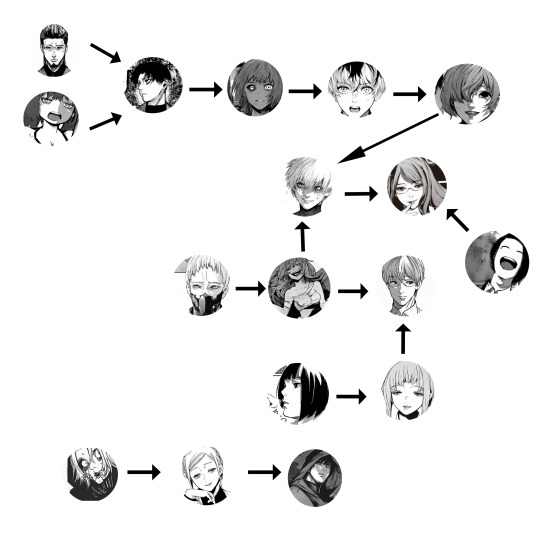
Why all of this unrequited love all of a sudden? Is it because Ishida wishes to write a Shoujo manga with corpses, and has decided to convert the last arc into one? It goes deeper than that, so let’s analyze it under the cut.

Furuta though might be a difficult example to start out with, he’s not the best at keeping a straight face, or his story straight either. He’s the kind of person who will cheerfully explain how he was born into child slavery with a smile on his face.

Furuta is a rarity among Tokyo Ghoul villains though, because even though we’ve already elaborated on his tragic backstory™, he has yet to show any true angst over it. Arima was always ice cold and empty on the inside, Eto was consumed with despair and wanted to destroy everything, Tatara was only barely managing to suppress the flames of his anger, to name a few. All of these characters who wear their trauma and reasoning for fighting on their sleeves, and then here’s Furuta. He seems content with just getting in a good laugh.
Furuta even on his own motivations is vague at best. Besides the “Super peace” quote, the best insight we get to direct questioning is:
“I will do what I want. I mean, I’ve got this precious life and everything might as well make the best of it, right?”
Which actually sounds a bit familiar:

Now, what Furuta did to Rize was horrible, but I think the fandom forgets she wasn’t exactly a saint before that point. There are actually more similarities than differences in Rize and Furuta, and it definitely comes from the place they were raised. Two garden children, one a meaningless throwaway meant to serve the family, and another a womb only meant to give her body to the family, or more specifically the men who had created the horrible structure she was born into and continued to perpetuate it. One escaped, and one stayed behind.
Though the garden might have been manageable if these two opposites stayed together, when separated their experiences warped them. Once Rize escaped, she could not stop escaping. Every single restriction, even those placed on her by well meaning authority figures reminded her of home.

Even escaping into freedom she realized, she was still in a cage. She probably could not handle the idea, and that was why she lashed out at the things around her. In her own mind though, it was not due to what had happened in the past, but rather an expression of her own strength. Rize was violent towards others because she was strong, because she got bored easily. Though, that kind of interpretation falls apart when you look at Rize’s victims.
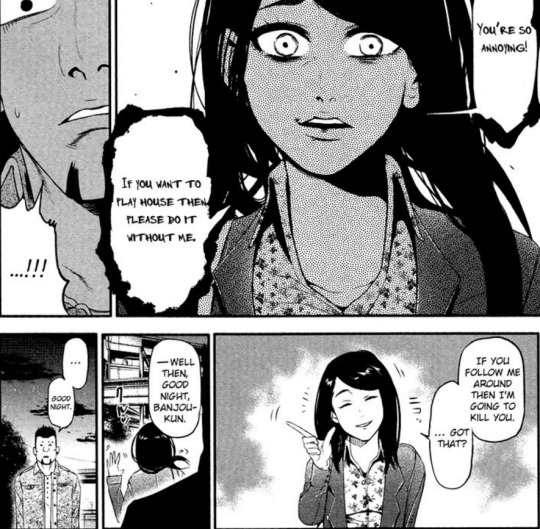
Men who placed any expectation on her. Whether it was Banjou who idealized her as a strong ghoul, Kaneki who saw her as a fellow lover of books, Rize is reminded again and again by the way men look at her of what she was born to be, of her home. A reminder she wants to escape from so bad, she’ll fight against everything around her, even the stable home she had in the sixth ward.

Rize was constantly trying to escape from herself, because the garden had taught her not to see herself as a human being. This goes beyond the human vs ghoul divide, Rize likely did not even regard herself as a person if she was born to just be breeding fodder. Even after escaping from the garden though, in her unwillingness to admit those vulnerabilities, in an attempt to cover them up she continued to deny herself personhood Because of that Rize is empty on the inside, that is her boredom, the thing she can never fill up no matter how much she binges. It’s almost like Kamishiro Rize never existed in the first place.
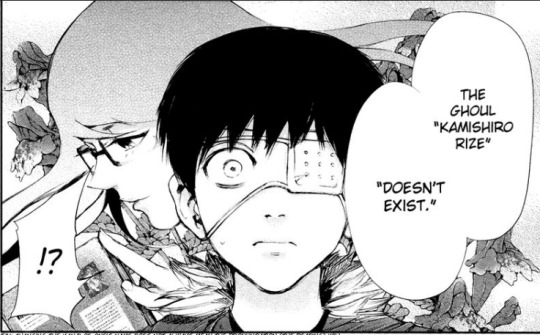
Perhaps that is why everybody seems to project whatever they want onto Rize, because she never had that much of a personality to begin with. Just try to describe Rize for a moment, she’s.... vicious, bloodthirsty, but those are just her actions. She likes books? She gets bored easily? Those are just hobbies or patterns of behavior.
Here’s where we finally return to Furuta. As I said, the two are more similiar than they are different, to the point of being foils. Furuta is also another person without a strong sense of self, it’s how he can in one moment flip from this:

To this:
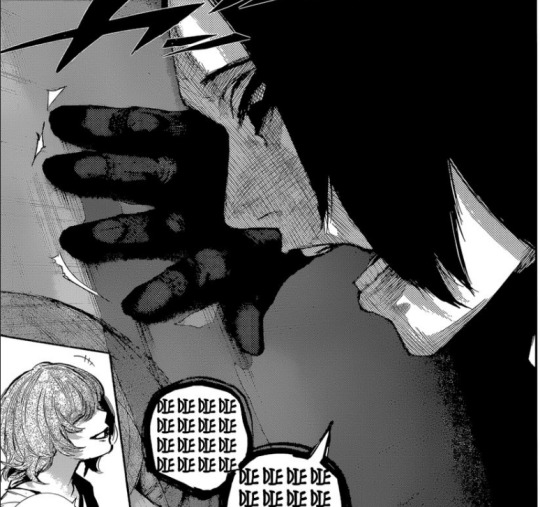
To this:

That was just from one scene though, you can pick a few more scenes: Furuta and Eto round two, Kaneki and Furuta talking for the first time after Kaneki became one eyed king, and the result is the same when Furuta takes a step back from his disguise personality as a meek assistant, he acts so erratically he may as well be throwing personality traits against a wall to see what sticks. One might think this lack of self would be a disadvantage for Furuta, but he’s weaponized it, because as long as the moment calls for it he can become anybody.

His acts tend to go so deep though, that on two occasions we’ve seen his inner monologue, which usually presents a characters true thoughts on the manner go along with what are his obvious lies to the readers.

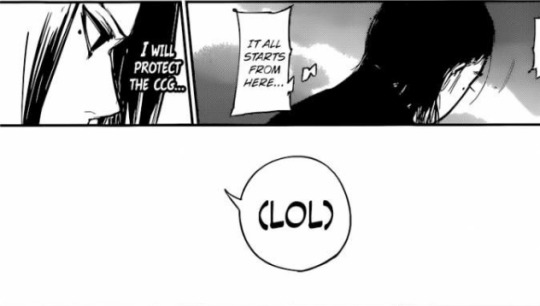
Furuta does not want to be a person, just like Rize. The way he foils Rize though is that he goes in the complete opposite direction. Rize wants to escape from the society that created her, so much so she’s always trying to escape. She becomes the concept of freedom to others. Furuta however, stayed behind in V. Apparently, all that time plotting to take it over fro the inside out. To Furuta, the path forward is to stay inside the system and master it perfectly, Furuta wants to become the system. Thus Furuta’s art in the Calendar being him literally reveling while still inside the cage. In a series all about breaking the cage, Furuta wants to keep it in place, because he’s been climbing to the top of it all his life.
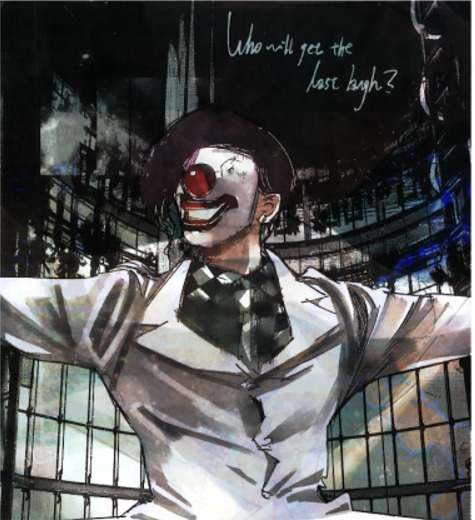
I hope this brief character moment has also done away with two common misinterpretation’s of Furuta’s character. One, that he has no consistent personality or motivation (That’s the point Ishida is trying to get at).
Two, that Furuta seems to exist without consequence in a narrative that otherwise is very consistent at keeping karmic consequence on every character within it. Tokyo Ghoul is a tragedy after all, they are not known for their leniency. Furuta however has murdered, Matsumae who was only trying to protect Shuu by laying down her life, killed Shiono and innocent, offed Eto before her revolution could even hit full steam and then stole even that forward motion to kill the Washuu and place himself in power, and also played double agent several times without getting caught once. Despite doing clearly bad things, Furuta is unaffected by them himself, and every consequence possibly dealt his way he shakes off.
Furuta can be such a hypocrite at times, it’s basically a major facet of his personality.
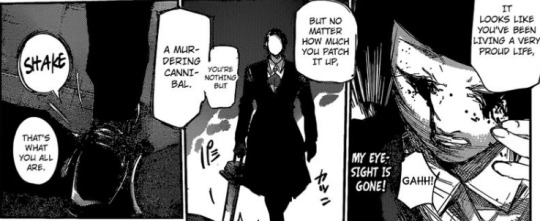
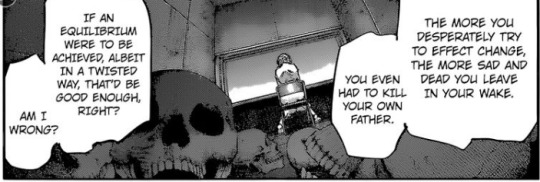

Remember though, that the system Furuta is trying to embody is hypocritical in itself. A system of rank and achievement that claims to be for the protection of humanity from ghouls, but is run by ghoul’s themselves who have sold out their own kind. For Furuta, indulging in his own hypocrisy is part of the joke. He’s the man determined to get the last laugh after all.
Even if I celebrate it, I can’t help it.
I’m just a human being who doesn’t think of anything about the day they were born.
PS: (Laugh, it’s fun!)
[x] I Have Become 6 Years Old
As referenced in his birthday poem, Furuta thinks absolutely nothing of himself at all as being born a human being, but encourages others to laugh anyway. It’s almost like a coping mechanism.
Then returning to why Furuta seems to escape karma despite quite clearly being a hypocrite who does bad things. It’s for more reasons than just ‘he’s the villain’ in true tragic narrative both the villain and the hero still face consequences. In a perfectly structured tragedy though, the failing that allows tragic consequence to finally catch up to them should come from a fatal flaw.
However, the modern understanding of fatal flaw is different from the greek one. The greeks believed in “Hamartia”, which was a flaw:
The tragic hero's powerful wish to achieve some goal inevitably encounters limits, usually those of human frailty (flaws in reason, hubris, society), the gods (through oracles, prophets, fate), or nature. Aristotle says that the tragic hero should have a flaw and/or make some mistake (hamartia).
This flaw was often how the hero differed from society as a whole. It was why Aristotle’s definition of tragedy ends with,
“purification" (catharsis): tragedy first raises (it does not create) the emotions of pity and fear, then purifies or purges them.
Therefore, having purified themselves from the flaw through watching it in theatre, the audience could return to life participating as good greek citizens.
The Furuta shown throughout most of Tokyo Ghoul though is the perfect representation of the society set up by the CCG. He is perfectly respsectful to superiors, cuts down ghouls without mercy, and climbs the rank due to his gaining strength. Most of all though, in a society that suppresses individual will and personhood, Furuta makes no attempts at being a person. By allowing society to perfectly overtake him, by being such a perfect actor, Furuta shows no defects from the society he was raised in. He has no hamartia, and therefore no consequences.In a cast full of characters who are trying to suppress their emotions to reach external goals, promotion, gain strength and power, destroy what’s around them, Furuta is simply the best actor almost to the point of being aware of the scenario he’s in. That’s why he succeeds.

However, nobody can keep up an act perfectly. For Furuta, the consequences of his actions, and the pathway he’ll get there has already been set.

This is called foreshadowing, it’s pretty obvious too. Here’s where we have Furuta’s source of Hamartia. In a society where men are called to use women like breeding tubes, especially Washuu men, Furuta truly loved one woman once. So much so he risked his own freedom so she could have hers.

Rize could have left it at that, but he’s clearly still planning to use Rize. Even though if he really wanted to live without affection, and become the perfect embodiment of the system he is acting as, he should just dispose of her and sever all ties. Furuta is not acting logical here though. He’s bringing Rize back under his control so she can’t roam free anymore, but he refuses to kill her either.

He claims his reason is so he can marry her again, and produce many offspring. This is obviously another farce on his part. It’s doubtful Furuta lacks so much self awareness that he thinks Rize would really love him after this point, or that he thinks he’s somehow doing better by Rize by harvesting her to create more of Kanou’s quinx out of what seem to be garden children, rather than forcing her to conceive Washuu heirs.

Let’s assume for a moment that Furuta is not a cartoon character, but rather a person that is cognizant of all of these things. What exactly is he trying to accomplish with his treatment of Rize then? On a basic level he’s objectifying her, removing her personhood. He’s turning her into a tool to further advance his efforts, but why?

When Furuta was caught off guard by Takatsuki, the first thing he flashes back to is Rize Kamishiro, in what possibly was one of their first meetings.

Rize is probably the only thing Furuta has ever really wanted for himself. Furuta is strong right now, but he associates the time he was weak and powerless with his memories of Rize. That was also the only time Furuta was ever genuine, before he started putting on masks and laughing through life. His love for Rize is his last vestige of humanity in himself. That’s why Furuta makes a conscious effort to control her, to objectify her, because he doesn’t want to be a person. The same way that Rize lashed out violently at everything around her.
The two of them both didn’t want to be reminded of how weak they really were. For Furuta though, rather than a societal construct, that reminder lies wound up in a person, a person he spent childhood days laughing and playing with.
Love reminds Furuta of what makes him human. Furuta is nimudashing away from his humanity though, he has to in order to fit into his society. Thus, there’s no room for love either.
Furuta probably did, and still does really love Rize too. No matter how twisted he shows it. One might recall the sky falling poem.
It’s always like this.
Only people dull to pain hurt me.
She truly loved me,
Only she didn’t know how to love.
What a stupid God.
[X]
What else can you expect though, from a boy growing up in a breeding garden where he was shown no love.
Haise’s Birthday Poem begins with the lines [x]:
“Someone said this:
“Even if you have no memories of being loved, for as long as you have memories of loving someone, you can continue to live.”
…But how is someone who has never been loved be capable of loving someone else?
A child who wasn’t able to receive the minimal love they required at the time they needed it the most will continue to gaze at the illusion of affection and never know how to love until the day they die.
Well, how about me? Can I continue to live?”
One might point to this as Furuta’s moral failing, that he now is stuck chasing after the illusion of love in Rize.
Remember though, that Furuta is not the only character to project onto Rize.
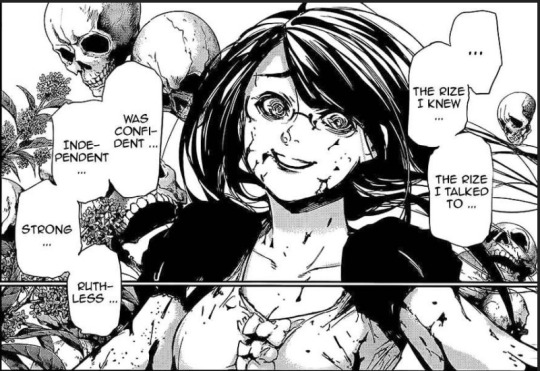
He’s not the only one who wanted to take her strength for his own, whether symbolically or literally.

Looking at the chart posted at the very beginning of this post, this entire arc is filled with characters chasing after the illusion of love. Taking the example from Haise’s birthday poem, we’re finally given why Unrequited Love is so prominent in this moon arc. ‘How is someone who has never been loved capable of loving someone else?’
How are these characters who exist in a society that has never shown them love, capable of finding love anyway? To some extent, every single character is acting like Furuta. They are repressing some part of themselves to achieve a goal they think they want, while at the same time fantasizing about some unattainable intimacy with another person that they believe is love.

Be it Matsuri, who only wants to have the freedom to choose for himself, but chooses to support the oppressive regime of the Washuu instead. He forefeits his freedom for power.

Be it Urie, who violently lashes out at a ghoul while thinking that all he wants is to take Mutsuki home. At this point he’s forefeited most of his humanity and gotten nothing in return.

Be it Mutsuki, who finally gained a stable home environment and something strong to control him when Haise Sasaki was around, but only ever developed his personal strength and eventually gave up that peaceful setting for violence.


Haise, who was so afraid of his past, but looked at Touka and cried because for once he was reminded that there were beautiful things about his past as well. Who however, chose not to pursue that past because of his current security at the CCG.
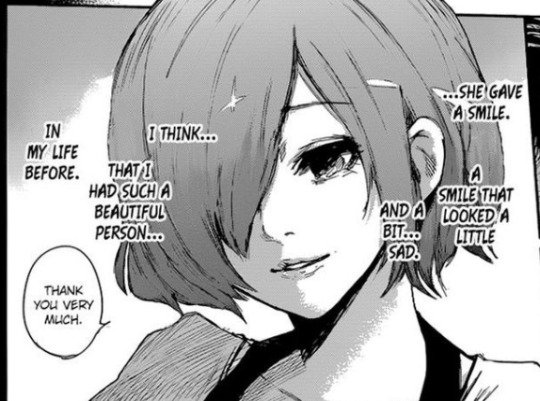

Be it Touka who tried to blunt, brash, violent, unlikeable, to blindly push away all attachments, only to cry while she was alone when they left. Who wound up the opposite of all of that and waiting quietly for a person who had been erased, pining effectively.
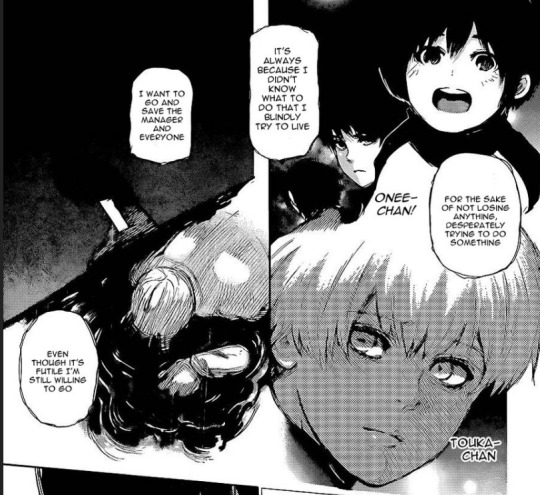

Be it Tatara, who claimed he was happy with everything, including the death of Aogiri tree if it meant that his hatred could end with Houji’s death. The man who gave up everything for his own hatred and revenge, only to die claiming he didn’t get what he wanted.

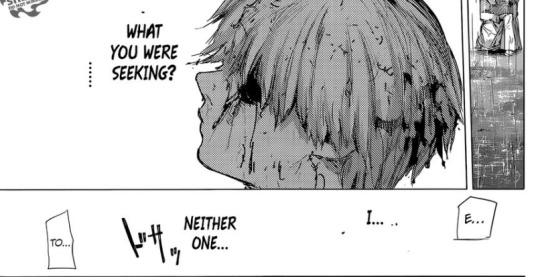
Be it Eto, who sought somebody to provide her with hope, and for that sake gave up her identity as Takatsuki, her editor, her foster parent, the lives of many CCG investigators, her freedom in the end, for the sake of that revolution, only to end up in this state just as her revolution was beginning to turn.
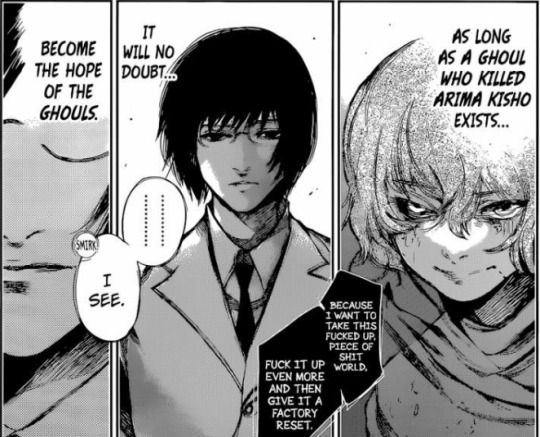


Be it Ui, a delicate person who thought he wanted to become strong so he could stand as a hero of justice. Who gave up his tender side to the CCG to gain that strength.Only to realize after he had lost them all what he wanted was the human connections he had formed through the ranks of the CCG.

Be it Hairu, who claimed she wanted to be strong so that Arima would acknowledge that strength. Only in the end to flash back to the garden in her dying moment, as it was the only time in her life she was shown kindness or treated like a person.
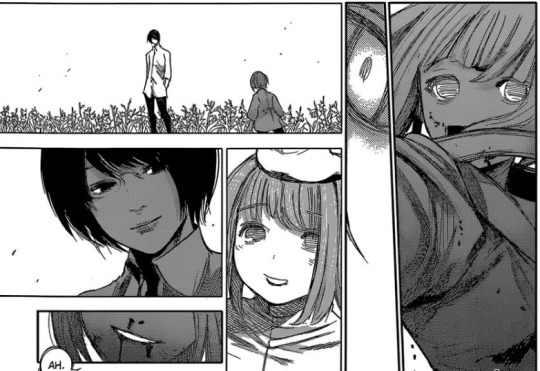

Be it Takizawa, who thought he wanted to get stronger so he could surpass those he saw as extraordinary. He thought he wanted to escape the role of second best, thus he violently fought against Sasaki and decided to play ghoul and give up his personhood. Only what he really wanted in the end was the security of being acknowledged, and to be acknowledged by one person.

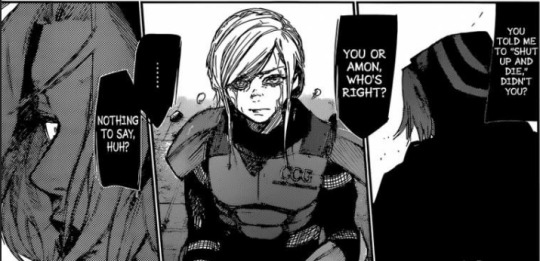
Be it Akira, who claimed she wanted to get strong in order to avenge her mother, and father, and suppressed herself to act as the perfect CCG agent in each of her dead parent’s place, but in the end only wanted to have somebody see her as herself, and by that extension be able to act on her own wants.

The pattern of characters denying some fundamental part of themselves, some part of their personhood in order to achieve some goal they think they want and to eliminate their weakness, only to secretly project onto another person the emotional intimacy, the personhood, and the vulnerability they think is impossible to have is a pattern that repeats again, and again, and again, and in this arc especially as the world is starting to come apart and change.
The reason this pattern repeats is because for these characters, love cannot exist in their worlds. It cannot exist in the rigid patriarchical system of the CCG that stamps out humanity and weakness, because to love is be human and weak. Therefore you get these characters who want with all of their beings, but cannot take a single step to move towards that love. What is the result of that? Eto summarized it quite nicely.

These characters unable to find fulfillment in their love, are pushed forward towards violence and destruction. Thus the cycle seems to continue, on and on forever.
A manga with that much unrequited love is therefore, not a shoujo with corpses, but a straight up tragedy.
#tg meta#furuta nimura#rize kamishiro#kaneki ken#meta#tokyo ghoul theory#tokyo ghoul meta#don't look mak
1K notes
·
View notes
Text
Nick Allen's Top Ten Films of 2018
Below is a small glimpse at my film year, a collection of the movies I was fixated on during and after festivals, recommended to you if you asked me what was good, or was simply blown away by. And in the case of my number one film, it was lodged so deep into my brain that its second-to-last shot made for a solid homemade Halloween costume. Of course, this list is subject to change at any minute, with special shout-outs to “Roma,” “Minding the Gap,” “Eighth Grade,” “Widows,” “Vice,” “Free Solo,” “If Beale Street Could Talk,” “Blaze,” and the laugh-out-loud quality of “Mile 22.”
10. “Bird Box”
In 2010, Susanne Bier made one of the most unforgettable stories about the immediacy of day-to-day violence with “A Better World,” its plot hinging on acts of humanism across continents. She brings that focus on how we treat each other to the ruthlessly thrilling “Bird Box,” which tops off a year of nervous cinema, but is approximately 300% more stressful than the silent but deadly “A Quiet Place” (nor can “Bird Box” have its logic poked through by the prospects of farts). The hook here is an apocalyptic disadvantage—one’s eyes must always be covered from an outside force that invades consciousness, making them want to hurt others or themselves.
Adapted by Eric Heisserer from the novel by Josh Malerman, “Bird Box” takes the set-up of a survival story to its most tense limits, where characters are walking, driving, or riding down a river through unknown environments, without being able to see where they are going. In a year in which watching white supremacy terrorize families in “The First Purge” seemed redundant, “Bird Box” is one of the most terrifying depictions of fanaticism; those who do decide to see sometimes have a frightening, monstrous power, and try to force others to look. It's a scary reflection of our modern cults built on hatred, anonymous conspiracy theories, or willful misinterpretations of the Bible.
The whole of "Bird Box" hinges on dumb luck, but each major set piece has an inescapable claustrophobia, in which the ability to see what the blindfolded characters can't, and imagining what could befall them, makes it that much more terrifying. At the center of it all is a top-level performance from Sandra Bullock, portraying a mother in the most desperate mode of survival. She makes a viewer even more wistful that somehow she and her two blindfolded kids can survive the film’s impossible world.
9. “Searching”
Aneesh Chaganty’s “Searching” is a thrilling correction to a few bugs in mainstream filmmaking: it’s an unabashed crowd-pleaser that doesn’t talk down to its audience, a tech-savvy movie that doesn’t lament the growing presence of smart phones and social media so much as whole-heartedly embrace them, and a screen-based thriller that isn’t just the cinematic equivalent of watching a desktop. That it’s also a thriller that gives John Cho the leading role he’s long deserved is just one of its many elements to adore.
Scripted by Chaganty and Sev Ohanian, this story about a father (John Cho) searching for his missing daughter Margot (Michelle La) is one of the year’s most exciting examples of creativity, with elements of filmmaking one can easily take for granted—it’s one of the year’s best edited films for how it creates an emotional roller coaster using only the content on its characters’ screens, orchestrating a narrative out of an insane amount of on-screen detail that fully immerses us in everyone's lives. "Searching" plays wonderfully on repeat viewings, and the opening scene has deservedly won comparisons to the first ten minutes of “Up”—“Searching” is the debut of major storytelling talent, with a thrilling new perspective on the technology we use every day.
8. “John McEnroe: In the Realm of Perfection”
“John McEnroe: In the Realm of Perfection” is a sports documentary that begins with a Jean-Luc Godard quote, and doesn’t show its title subject until five minutes in. Yes, this movie is a dream for anyone who has felt film semiotics and sports analysis aren’t too different of beasts, especially when one talks about the strengths and weaknesses of a performance. Needless to say, “John McEnroe: In the Realm of Perfection” transported me back to my brain-fueling Film Studies classes, all focused around a pivotal match for the hot-head tennis player in 1984. This doc does not just thrill with how it toys with form, but also in how it proclaims the expansive potential of critical thinking. I dare anyone who is interested in the very concept of criticism, whether for athletes or filmmakers, to try to turn it off after watching it for those five minutes.
7. “Makala”
“Makala” popped into my life as a review assignment back in August, and by the end of the year it’s still the most exemplary idea of the power in minimalist storytelling. One of the most tense scenes this year is of Makala trying to push a huge bundle of coal, strapped to his bike, up a small hill, as captured with simplicity by director and cinematographer Emmanuel Gras. As it documents one man’s process in creating coal, carting it many miles and then trying to sell it, “Makala” speaks to the eternal values of filmmaking, and recognizes that walking many miles in someone else’s shoes is an instrumental part of it.
6. “Cold War”
Anyone who was a bit miffed by the ending of Damien Chazelle’s musical “La La Land”—not that it ended on a surprising note, but that it felt like an incomplete thought—will find refreshing heart and soul in Pawel Pawlikowski’s musician story, “Cold War.” Told over various years and across countries, the story of two Polish musicians and their romance in spite of years and geographical distance beautifully condenses time but doesn’t cut short its emotion. “Cold War” precisely captures the different chapters of a relationship, while having a black-and-white beauty that makes the film like the year’s best love ballad.
5. “Mandy”
Like a holy mix of “You Were Never Really Here” and “If Beale Street Could Talk,” as blended with a chainsaw fight and served on an actual dish of revenge, “Mandy” is one of the year’s most visceral proclamations of love and loss. Be not fooled by the howls from its growing cult audience, the best aspects of “Mandy” (directed by Panos Cosmatos and co-written with Aaron Stewart-Ahn) are not its albeit glorious action scenes but its sensitivity: this is the story of a man (Nicolas Cage), a woman named Mandy (Andrea Riseborough, her close-up laughing at macho BS the true face of this film) and the depths of his battling the demons of grief after his loved one is taken away. The late Johann Johannsson’s heavenly score uses synthesizers and heavy metal guitars to grip you from its opening text, and the film’s heavy use of color filters creates a dreamy atmosphere, which only gets kookier as “Mandy” becomes a straight-up hero odyssey with Cage battling phantasmagorical Jesus freaks. But the true beauty of “Mandy” is its intimacy; it’s as beautiful as looking into the eyes of your loved one as you both lie in bed, no one else existing in the world.
“Mandy” also features an unforgettable Nicolas Cage scene, in which he downs a whole bottle of vodka in a bathroom while standing in his underpants. He’s crying, howling, screaming. It epitomizes the appeal of one our greatest screen artists—that Cage is unafraid to tap into the absurd emotions we sometimes wish we could—and it pushes the surrealism of the scene to sincere and complete heartbreak. I’m placing “Mandy” in my proverbial “In Case of Loss, Break Glass” collection, right next to a copy of Philip Roth’s Everyman.
4. “Leave No Trace”
I really love what my colleagues have written about Debra Granik’s story of a PTSD-afflicted father living off the grid with his young daughter, but one of my favorite qualities of this nearly pitch-perfect story is that it’s not what you think: it’s not about them living in the woods, but adapting to our society, a story that takes place after what only seems like the true narrative. The completely soulful performances from Ben Foster and Thomasin Harcourt McKenzie create a family dynamic you don’t want to see disturbed, and through small developments there’s a large unease that capitalism and technology could get in its way. Granik’s script, adapted with Anne Rossellini from Peter Rock’s book, has an incredible rhythm with its bare bones scenes, exploring the greatest of emotional stakes in the most deceptively simple way.
3. “Madeline’s Madeline”
In a sense, “Madeline’s Madeline” is a movie that was made for its debut lead, Helena Howard. You understand, about thirty seconds into the film, why Howard warrants her own project, and why a filmmaker like Josephine Decker would mix her own experimental and primal instincts with the talents of her future young star. “Madeline’s Madeline” is delightfully beyond words—describing it as a film about acting and actors is just scratching the surface—but it’s one of the most year’s most hypnotic movies, especially as Decker’s camera toys with point-of-view and takes an approach to editing that is unlike any other film from 2018.
2. “Shirkers”
I spent much of my Sundance last January recommending to people a little documentary called “Shirkers,” and ramped up that practice when it came out on Netflix this past October. Believe the hype for this movie, which just took our #6 spot on the staff list, and is one of the few docs that has been making waves on #FilmTwitter. It’s both a celebration of and a mystery movie about the lost treasure of a film project that Tan directed as a teenager in 1990s Singapore with her friends, which then disappeared along with her pushy filmmaking mentor, an older white man named Georges, before the film was finished. “Shirkers” has Tan investigating what happened to the project and looking back at her life when she was a teenager making her cool-as-hell film that predates the style of "Ghost World" and Wes Anderson. Perhaps best of all, Tan shares with us the filmmaking daydreams, and the collaborating women, that fueled such an enigmatic passion project.
1. “Hereditary”
I believe “If Beale Street Could Talk” director Barry Jenkins put it best when he once tweeted to “Hereditary” writer/director Ari Aster, “GIVE ME BACK MY PEACEFUL SLEEP,” followed by six crying emojis. Speaking as someone who has now seen Aster’s masterful debut five times (including an experimental, not recommended double feature at the theater with Fred Rogers doc “Won’t You Be My Neighbor?”) I can only affirm the lasting power of “Hereditary” and its perfection as a modern American family tragedy that uses horror language in order to devastate its viewers.
There are so many elements to cherish about the film, including its exact creepiness with slow-moving shots and deceptively long takes, a score by Colin Stetson that peacefully conjures the devil, and the way that while a first viewing may inspire one to watch it through their fingers, "Hereditary" only gets more disturbing with each viewing. And all of this for a horror film that’s about a household that doesn’t discuss trauma, or about a family plot that’s a highway to hell. Most importantly, however, is the emotional magnitude brought by the likes of Toni Collette, whose viciousness as the central mother can rival the terror of Joan Crawford proclaiming “No more wire hangers” in “Mommie Dearest,” and Alex Wolff, depicting the shattered, silenced nature of trauma.
"Hereditary" is in the tradition of disturbing films like Kubrick’s “The Shining” or Zulawski’s “Possession"—it's equal parts terrifying and exhilarating, scarring a viewer with the emotional turmoil that's in the foreground. Aster's film messed me up in more ways than one in 2018, and it hurts so damn good.
from All Content https://ift.tt/2UNJS6a
0 notes